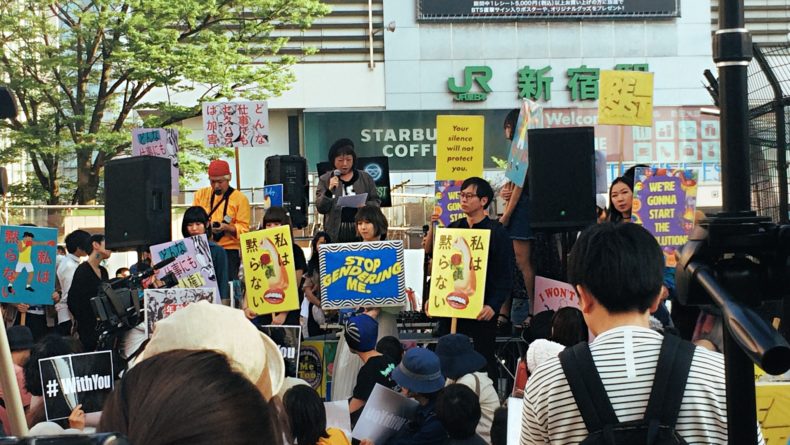Ladies & The Law: Making A Difference In Japan’s TV Industry Gender Bias
When will TV realize it needs to set a better example? People are watching.
Two significant cases when the Japanese courts played a substantial role in forcing an employer away from their biased view.
All over the world, television plays a substantial role in establishing or perpetuating the public’s views. In Japan, television portrayals of women and their role in society still tend to reinforce the views of the immediate post-war period—that Japanese women have fundamentally two roles: as mothers or as decorations. In light of Abe’s government’s purported goal of creating a society where women can shine — which most people have taken to mean a society where women can make a substantial contribution, rather than a society where women “brighten up the place” as decorations — the gender bias contained in this image perpetuation is unfortunate and arguably holds back both social and economic progress. Fortunately, there are times when the law intercedes to overcome that gender bias.
An uncalled for career change order
In early 1976, TS was at the top of her game professionally. She had been an announcer with Nippon Television since finishing university in 1959, one of only five announcers hired that year out of a field of over 2,000. But in 1976, after 17 years as a successful announcer, she got an order from Human Resources that she was being reassigned to the Investigations Department and would no longer be an announcer. TS was about to turn 40 and the company didn’t want her in front of the camera anymore. She did what any self-respecting professional would do under those circumstances: she took her employer to court, seeking an injunction to prevent them from forcing her into the change.
Perhaps the existence of that gender/age bias in 1976 is not so surprising. After all, Japan had not yet signed the UN Convention on the Elimination of all forms of Discrimination Against Women (indeed, the convention wasn’t even adopted by the UN until 1979). In 1976 the existence of strictly women’s roles in both society and the workplace was generally accepted in Japan. Most employers had an image of how women were expected to look and act that held women to a different standard than men were held to and prejudiced the professional opportunities of women. Jobs were even advertised separated by gender.
TS was about to turn 40 and the company didn’t want her in front of the camera anymore.
The Tokyo District Court didn’t consider gender when ruling on TS’s claim. Instead, it took a straight contractual analysis approach to determine that since TS’s employment contract specified that she was being hired for the job of announcer and she had given no express or implied consent to any other job, that specificity would supersede any provision in the employer’s work rules that permitted the employer to change an employee’s work assignment. It ruled that the employer could not remove TS from her announcer role without her consent, without commenting on the obvious gender/age bias motivating Nippon Television’s original decision. In other words, the court made exactly the same ruling it would have made if the plaintiff had been a man.
It is disappointing that nearly 40 years later gender bias in Nippon Television’s decision making was again exposed. And it is heartening that the law could, once again, play a role to overcome the bias.
The scrapped naiteisho
At the end of 2013, SR, a university student with aspirations of becoming a television announcer, received a naiteisho (an indication of intention to hire) from Nippon Television. Naiteisho are commonly used by companies when hiring students who have not yet graduated from university. A naiteisho is essentially a commitment from the company to give the student a job upon successful completion of his/her education coupled with a commitment from the student that he/she will join the company upon graduation. Based on those mutual commitments—effectively a tentative employment contract—, the student is expected to halt his/her job hunting activities.
This is what happened in the case of SR. But some months later, thinking she had secured her post-graduation employment, SR was shocked to receive a notice from Nippon Television that they were canceling her naiteisho. The station had determined that since SR had worked part-time as a “hostess” in a Ginza club during her student days she was unsuitable to work for them as an announcer. SR did what any self-respecting aspiring professional would do under those circumstances: she sued.
As the naiteisho system of hiring new university graduates about a year before their graduation creates a very limited job hunting “season” for those about to graduate from university and requires students to cease all other job hunting activity upon receipt of a naiteisho, cancellation of a naiteisho can be catastrophic for the individual. As a consequence, dating back as far as 1973, Japanese courts have developed law restraining abuses of the naiteisho system.
The station had determined that since SR had worked part-time as a “hostess” in a Ginza club during her student days she was unsuitable to work for them as an announcer.
The facts of the best-known 1973 Supreme Court case are not dissimilar to those of the SR case — the employer learned something about the employee’s background after the fact that made the company no longer want to employ him. In that case, the Supreme Court established the rule that for an employer to decide not to proceed with employment based on facts relating to the individual’s background there must be damage to the mutual trust relationship between the parties because the information (1) was learned after the employment contract was entered into and (2) established that the individual is not a fit to be a regular employee. The possibility of destruction of the individual’s future career prospects and the individual’s impeded ability to find other employment if the naiteisho cancellation was permitted are other important considerations.
In SR’s case, the employer had two possible reasons for cancelling the naiteisho: (1) that SR lacked integrity insofar as she did not disclose to Nippon Television her complete employment records, in particular, the fact that she worked part-time as a hostess, until after she had the naiteisho in hand and (2) that it was the experience of working part-time as a hostess itself that made her inappropriate to be an announcer.
The first reason isn’t gender-bound. At the same time, it appears SR disclosed her employment background herself when the company requested it of her, so the argument that she lacked integrity for not disclosing it earlier was a little thin. And taking a job from someone at the start of her career under circumstances where she has limited or no opportunity to find similar employment elsewhere is highly frowned up, both socially and legally.
The second reason is where gender bias comes in, and where this case gained notoriety at the time. After all, what’s wrong with working as a hostess, pouring drinks for and listening to male customers? The fact that someone at Nippon Television thinks that women who do such work are not suitable to work for the company, implies a gender-laden value judgment, that working as a hostess somehow taints a woman. Additionally, it implies that the company has different standards of behavior for men and women: patronizing such establishments is acceptable while working in them is not.
This case was ultimately settled via court-sponsored mediation, with the result that the company reversed itself and hired SR on the conditions originally contemplated. SR now works as an announcer for the company and appears to be building a successful career.
What triggered the change?
We cannot know what made Nippon Television change its mind in the mediation. The case received a lot of press attention at the time and Nippon Television was heavily criticized.
In the mediation discussions, the judge would have focused on the two points of SR’s integrity/trustworthiness and whether her background as a part-time hostess really rendered her unfit to be an announcer, and would have drilled into each side the relative weaknesses of their position, including the applicability to their positions of the standards laid out by the earlier court cases, especially the 1973 Supreme Court decision. Perhaps in doing so, the judge also emphasized the gender bias inherent in Nippon Television’s conclusions about working as a hostess and made the point that, in today’s Japan, such a bias is what is inappropriate. We cannot know for sure, because mediation discussions are strictly confidential, but the fact that the result was essentially a full victory for SR allows the conclusion that the court played a substantial role in forcing the company away from their biased view.
Both TS and SR’s cases are examples of an employer making decisions based on gender bias. Whether the fact that it was the same employer in both cases is a coincidence or not is not for me to say. What we learn from these cases is that at least in the occurrences of such overt bias we can be confident that courts will apply legal standards equally to women or men.
Vicki L. Beyer is a Professor of Law at the Hitotsubashi University Graduate School of Law Business Law Department.
Savvy Tokyo’s series “Ladies And The Law” digs back in time tracing the catalysts for change in Japanese laws that directly or indirectly affect women and their families. If you have a topic you would like us to cover through a real court case, contact us at editorial@gplusmedia.com
















Leave a Reply